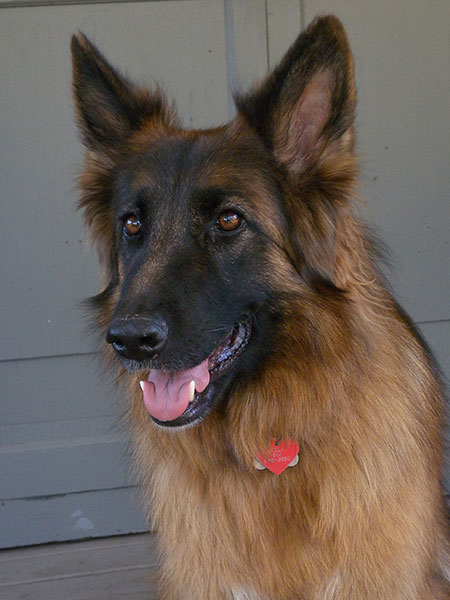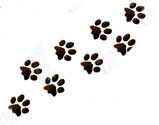This week’s blog is from Candida Pugh, essayist and dog-lover. I think you’ll find her observations about how dogs are like us, and also unlike us, thought provoking.
Thanks, Candida, for sharing these insights about what we can learn from dogs.

PS
Interested in being a guest-blogger? Contact me.
Real Dogs, Real People

When I was a schoolgirl—approximately a millennium ago—hanging on the classroom wall was a diagram in the form of a triangle broken into horizontal sectors. Humans occupied the peak, while “lesser” beings were boxed up in order of their presumed intelligence, from supposedly higher level mammals down to reptiles. Since then, we’ve learned that crows plot vengeance over years, elephants mourn ritualistically, and ants can be trained. In other words, that chart was a bunch of hooey.
I’ve often wondered if we, who adore dogs, don’t unwittingly buy into that chart by “elevating” our dogs into little people in fur coats. Don’t we actually love them for the many ways they do not resemble us? I believe, in many respects, our dogs, in fact, surpass us. My German shepherd, Sparkle, and my Havanese, Liam, can each locate a tiny piece of kibble in a huge garden. Sparkle, who loves bubbles, can jump higher than my head to pop one. They both can hear a UPS truck coming from a block away, enabling premature barking.
But those are not the only ways in which my dogs are superior to me.

While I dwell on the past and anticipate the future, my dogs dispense with time. I ask Sparkle, “Did you have a good walk?” and she gets excited. I tell her Charles, her favorite person, will be home soon, and she begins searching the house. I envy her ability to focus on what’s important to her, which is NOW! NOW can slip past me, barely noticed.
Part of focusing on the present is acceptance of what it holds, which dogs do easily because of their innate humility. My heightened sense of my own importance frequently leads me to view interaction through the lens of how well I’ve been treated or how well I came off. Not so my dogs. Rejection? What’s that? Vela, my barky German shepherd, was like the gawky kid who never gets picked for the team. Her lack of popularity never penetrated her lovely skull. At the dog park, she pursued un-requiting lovers with gusto.
Sweet-natured children may grow into belligerent, sullen teenagers who regard spending time with parents as a punishment. Spending time with me is all my dogs want to do. They get ecstatic over a game of “find it.” It takes a whole lot more than a game to make me happy, let alone ecstatic. But everything I do delights my dogs, as long as it involves paying attention to them. If it doesn’t, they go to sleep.
Dogs’ ability to experience joy over simple acts was probably part of the reason my father often said he preferred them to people. That attitude is easy to understand, given how comfortable dogs make us. Just as they don’t ask themselves, “Am I really having a good time,” they don’t ask themselves, “Is this person worthy of me?” Unlike my dogs, my husband is acutely aware of my many faults, and I am aware that he is aware.
Although, in so many ways, dogs do not resemble us, they have been known to exhibit a few of our less desirable traits along with the lovelier ones, such as showing affection and trying to comfort someone who’s upset. It’s possible, for instance, for a dog to be neurotic. I recall a friend who never left her Hugo without spending ten minutes reassuring him that she would be back and she was so so sorry to leave him. That poor dog was a bundle of anxiety. He would’ve been so much better off if she’d simply put on her coat and walked out the door. Dogs don’t know what to do with a ritualized goodbye. It takes a sense of time to comprehend a promise to return.

Ever have a friend who imagines you have an entire day to spend with them, if they happen to want you to? Some dogs are like that. As I sit at my computer, trying to finish a project, Sparkle, for instance, urges me to “pet me, pet me” with vigorous nudges of her nose. No matter how many times I say, “No, off,” for her, as for Vela before her, rejection vaporizes before it ever materializes.
Another way our dogs can behave like people is in being rude. A huge Labrador jumped my petite elderly friend while she stood in her driveway, knocking her to the pavement with enthusiasm. She suffered several broken ribs. Many dog aficionados would say that dog didn’t know what he was doing. I’m dubious. What I’m certain of is that he didn’t know the seriousness of his act.
Even so, consider, for example, a husky that rammed me in the side of my knee. My offense? I was standing next to his beloved owner and she was engrossed in our conversation. She believed he did it by accident. Although she treated him as her child, she never noticed that he was jealous of everyone who laid claim to her attention.
Why would we deny our dogs the ability to direct themselves at a goal? My sister-in-law had two dogs, one of whom routinely outwitted the other. When Jobe perched on the coveted bed, Rudy began to play with a desirable toy, acting as if he were having the time of his life. Invariably, Jobe would jump down to take the toy, at which point Rudy would claim the comfy pillow.
When Henry, my giant poodle—mine for less than 24 hours—abruptly took me down to the sidewalk by bolting toward another dog, he instantly returned to sit next to me as I recovered. He knew what he’d done. When my first German shepherd, Jessie, yanked me to the ground because I’d stupidly thrown a ball farther than the length of the long lead I had tethered her to, she raced back to me and refused to chase the ball again until I unhooked the lead.
In the end, what I say of dogs is they understand us a lot better than we understand them.

About Candida Pugh:
Candida Pugh, retired copywriter and author of My Life in Dog Years: A Poodle Named Henry & Other Melodramas, lives in Oakland, California, with her husband, Charles, and two adorable non-humans. You can find her books at all the usual places, and her short stories here: www.candidapugh.com
